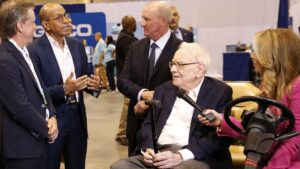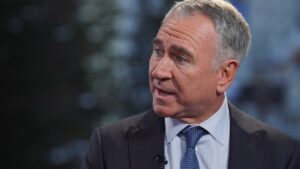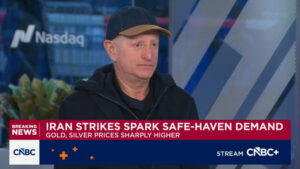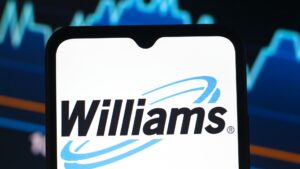The Value Gap is a MarketWatch interview series with business leaders, academics, policymakers and activists on reducing racial and social inequalities.
More help is on the way for small businesses hurt by the COVID-19 pandemic — and Leslie Odom Jr. doesn’t want them to wait for it.
Government shutdown orders, high unemployment rates and consumer spending concerns hurt small businesses over the past year and a half — and Black-owned businesses were hit especially hard as the pandemic exacerbated systemic inequalities, such as uneven access to capital.
The number of active Black-owned businesses plummeted 41% from February 2020 to April 2020; in comparison, the number of white-owned businesses dropped 17%, according to University of California at Santa Cruz economist Robert Fairlie.
So Odom Jr., the actor best known for playing third U.S. vice president Aaron Burr in the Broadway smash “Hamilton,” has taken on a new role helping small businesses access resources and funding to keep their doors open. This includes promoting Wells Fargo’s “We Made a Way” short-film series, which celebrates the small businesses that have managed to pivot during the pandemic to stay afloat.
The program is part of a campaign that connects entrepreneurs with digital tools, mentors and grants to help grow their businesses, including the financial giant’s Open for Business Fund. Some 84% of Open for Business Fund grants support “diverse-owned” small businesses, according to Wells Fargo
WFC,
“It makes me proud that they understood that in these moments in the past, there have been people that have been left behind,” Odom Jr. told MarketWatch in a recent interview, “and that they are doing all that they can in this moment of rebuilding, in this moment of restructuring, and trying to make sure that they are grabbing ahold of some people that have historically been left behind. And they’re trying to make sure that they don’t repeat those kinds of mistakes.”
“
‘All of us are trying to create, foster, invest in community. And if we’re not, we should be, because we don’t make it out here by ourselves.’
”
The Tony Award winner said he felt a personal connection to the project because he comes from a family of small business owners, including his sister and father. In fact, one of the financial service company’s film shorts features the Gibson School of Music from his Philadelphia neighborhood.
“I went to church in Germantown, right down the street from Gibson. I had lots of friends who took piano lessons there, and singing lessons,” Odom Jr. said. This particular vignette touched him, he said, because “I got to see these — not for nothing, these Black business owners, you know — who had a firsthand account of what the money had meant to them at an unprecedented time.”
Yet while the federal government’s Paycheck Protection Program extended $377 billion in potentially forgivable loans to help small businesses stay open early in the pandemic, institutional barriers — such as not having strong relationships with large banks and financial institutions — contributed to many Black-owned businesses missing out on the money. Some 61% of Black-owned businesses received PPP money, compared to 85% of Asian American and 82% of white businesses.
But these barriers can be broken down, a recent McKinsey paper noted, if banking institutions reassess their lending standards and help provide Black-owned businesses with equal opportunities for business loans and mortgages. It suggests that one way to address racial bias in granting these loans would be to provide more online opportunities for borrowers, rather than making them come to a bank in-person to apply, and to offer more educational resources aimed at business owners and their employees.
Banks and government agencies could also review their outreach programs and educational campaigns to make seeking financial assistance more user-friendly, which could make small business owners more aware of what resources are available to them, the paper said.
“I’ve worked [with nonprofits] for a long time,” Odom Jr. said. “So much of our work is creating awareness about the fact that we’re there. You have to get out there and bang the drum and say, ‘Hey guys, please apply for this grant! Please apply for this money, it is here for you.’”
Odom Jr. can see the parallels between the plight of these small businesses and his own decade-long struggle as an actor before his breakout role in Lin-Manuel Miranda’s “Hamilton” musical.
He had an auspicious start, making his Broadway debut in “Rent” when he was just 17 before going to college and graduating with honors from Carnegie Mellon University. But then he hit a wall. “When I came out of school 20 years ago, there weren’t as many places to use that training as you might have hoped. I remember going up to the world premiere of ‘Jersey Boys’ in La Jolla, which was a brilliant piece of theater for four white guys to get to really shine,” Odom Jr. told IndieWire earlier this year.
“
‘I’m a small business in so many ways.’
”
So when he learned about “Hamilton,” he jumped at the chance to be in the room where it happened. Miranda was consciously casting people of color as the Founding Fathers to portray a story about America then, as told by America now. “He wrote something for that new generation of artists, of people who look like me,” Odom Jr. told IndieWire.
That has opened doors that have allowed him to diversify his acting and singing portfolio. “I’m a small business in so many ways,” Odom Jr. told MarketWatch.
And he has hustled to keep his name on everyone’s lips with an array of projects over the past five years, including three studio albums and a memoir, as well as voicing the lead character on the animated musical-comedy series “Central Park” on Apple’s
AAPL,
Apple TV+. He earned an Oscar nomination for playing Sam Cooke in Regina King’s “One Night in Miami” last year, and will star in the upcoming “Sopranos” prequel film, “The Many Saints of Newark,” and the “Knives Out” sequel.
With that said, Odom Jr. mused that the best career advice he ever got was from his mentor (and now father-in-law) Wren Brown, who called him out for waiting for his big break.
“He said, ‘Well listen, I think you’re sitting at home and you’re waiting for the phone to ring … In the absence of a ringing phone, did you call anyone? Did you email anybody? Did you apply for any grants? Did you write anything, did you read anything?’” Odom Jr. recalled. “He just pointed to all of the ways in which I could help myself.”
Related: These small-business owners are still making it work, coronavirus and all
And: Small businesses had to adapt in the pandemic: some innovations that we’ll continue to see
Still, he also needed someone like Miranda to actually give him a shot. In a similar vein, campaigns to help small businesses such as Wells Fargo’s Open for Business Fund, grants from the Small Business Administration, the Paycheck Protection Program through Square and free digital training courses via Alphabet’s
GOOGL,
Grow with Google can give entrepreneurs a lifeline to help themselves stay afloat in unprecedented times like these.
“I don’t want to get on a soapbox, and I don’t want to lecture,” Odom Jr. said. “We all know what we’ve lived through the last year and a half … All of us are trying to create, foster, invest in community. And if we’re not, we should be, because we don’t make it out here by ourselves.”
The bottom line, he added, is that people have to look out for one another.
“I don’t have to tell Americans, ‘Know the importance of community’ — we know that,” he said. “Sometimes we need reminders, and sometimes we get reminders — things like, you know, global pandemics. But our neighbor is our responsibility. And the small businesses in our community are our responsibility. … I want to see them survive.”
This post was originally published on Market Watch






